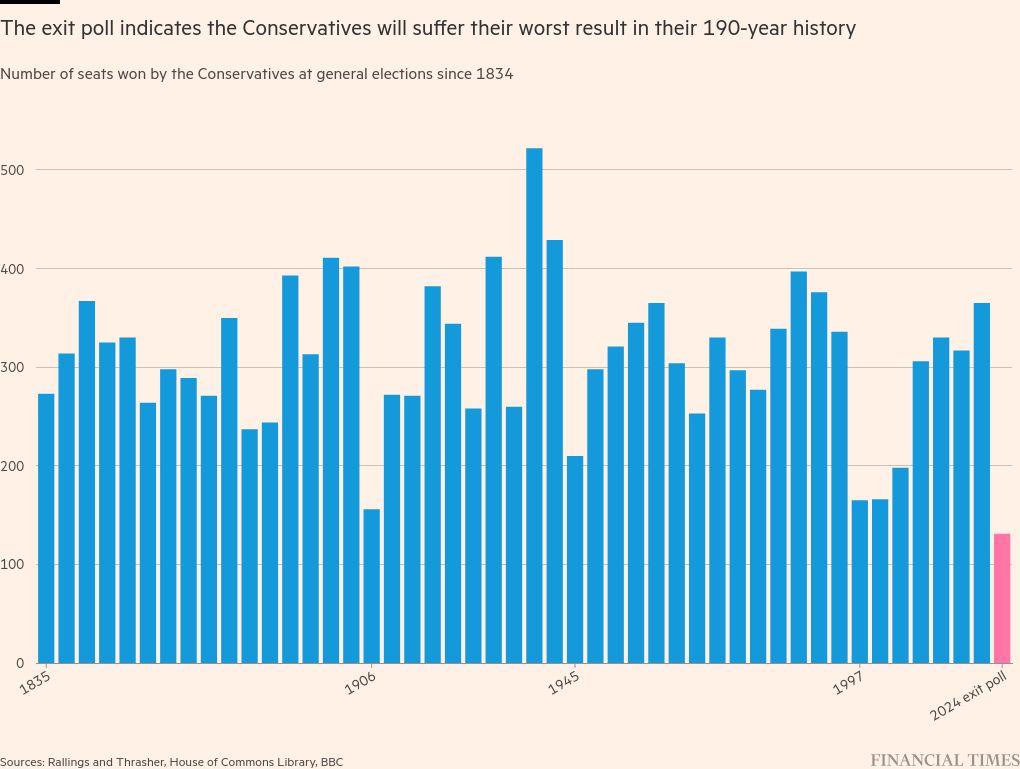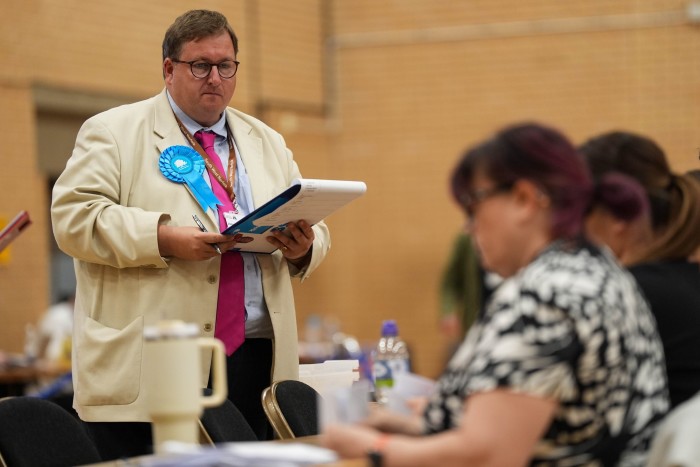
In the end, time caught up with Britain’s Conservatives. Voters turned with vengeance on Thursday against a party unable to escape its own record.
Former chancellor Kwasi Kwarteng said the malaise went far deeper than the havoc caused by his disastrous “mini-Budget” in 2022 that crushed the party’s reputation on the economy: “It’s on the whole party. It’s on 14 years.”
For all of Rishi Sunak’s attempts to insist the election was “about the future”, it is Labour’s Sir Keir Starmer who now owns that political space: he has promised a “decade of renewal” for the UK, although the challenges are formidable.
At 10pm, Britain’s political landscape changed beyond recognition: a national exit poll showed swaths of Tory blue on the electoral map replaced by Labour red, a wedge of Liberal Democrat gold in the south and swatches of Reform UK purple.
Steve Baker, a Tory minister, said it was a “pretty devastating night” while another former cabinet minister summed up the result with a simple head-in-hands emoji.
The 131 seats projected for the Conservatives in the exit poll were better than some of the more apocalyptic forecasts. However, it would still be the worst result in the party’s history.

“It is clearly a terrible night for the Conservatives,” said former minister Sir Jacob Rees-Mogg as he surveyed a scene of electoral devastation. The Tories ceded ground to Labour and the Lib Dems on the left, and Reform presented a new threat on the right.
Ultimately, Sunak was unable to throw off a Tory legacy that stretched back to the arrival of a fresh-faced David Cameron in Downing Street in 2010, leading a coalition with the Lib Dems.
Since then, the UK has contended with austerity, Brexit, Covid-19, an energy price shock, Liz Truss’s disastrous premiership, Boris Johnson being ousted from Number 10 after lying to parliament, record-high migration, the tax burden hitting a 70-year high and NHS waiting lists swelling to 7.5mn people.
Starmer ran on a devastatingly simple campaign slogan: “Change”. And when the political tide turns under Britain’s first-past-the-post voting system, it turns decisively. Starmer will enter Downing Street with a majority similar to the one achieved by Sir Tony Blair in 1997.
Sunak could find no way of holding together the Tory electoral coalition assembled by Johnson in 2019, aided by a national desire to “get Brexit done” and an ineffective leftwing Labour leader in Jeremy Corbyn.

The new electoral map confirms the total political failure of the Tory promise to reduce Britain’s regional inequalities by “levelling up” the north of England, as the “Red Wall” returns to Labour hands.
Ominously for the Conservatives, Nigel Farage’s Reform UK has emerged as the main challenger in many of the socially conservative, working-class northern towns conquered by Johnson, a trend evident with the first result of the night in Sunderland South, shortly after 11pm.
Here, Labour’s shadow education secretary Bridget Phillipson increased her vote in the constituency from 16,210 to 18,837, but the Tory vote slumped from 13,095 to 5,514, seemingly due to a rise in support for Farage’s party.
In 2019, Reform’s predecessor — the Brexit party, also helmed by Farage — came third with just 6,165 votes in the area but this time around the rebranded party picked up 11,668 votes and came second.
Those Tory MPs who survive the deluge will now have to decide whether to take their party in a right-wing Faragist direction and take on Reform on issues such as immigration or to cling to the centre ground.
Ben Habib, Reform UK’s joint deputy leader, called the projected result a “bridgehead” for his party. Farage has vowed to replace the Tories as the main party of the right at the next general election, which must take place by 2029.
Sunak had attempted to fend off Reform with his plan to send asylum seekers to Rwanda and his promise to bring back national service. The 10pm exit poll showed his efforts had succeeded only in driving away core Tory supporters in wealthier, professional areas in the south of England.
Sir Ed Davey, Lib Dem leader, was celebrating projections that his party could end up with 61 seats, mainly in Tory “blue wall” constituencies in England’s south. The forecast result is close to the record 62 won by Charles Kennedy in 2005 in the aftermath of the Iraq war.
Some constituencies, inhabited by City traders, senior civil servants, top lawyers and leading academics, are now virtual no-go zones for the Tories. In London, the UK’s capital and most prosperous city, the Conservatives face a near-wipeout.
The electoral landscape also shifted decisively in Scotland. The exit poll suggested the Scottish National party might win as few as 10 seats, crushing its hopes for a renewed tilt at independence.
Alongside the gloom at SNP headquarters, Tory figures were in despair as the results rolled in through the early hours of Friday. “There is a long night ahead,” said one Conservative official as the likely scale of the party’s debacle became clear.
On Friday, Sunak will leave Downing Street for the last time, unable to escape the shackles of the past. “He will go down as the Conservative prime minister and leader who had the worst election result in over a century,” said an uncharitable Sir Brandon Lewis, former Tory chair.
Starmer will arrive in Number 10 hoping that the future might be less forbidding, but knowing that the challenges are huge.
A majority of about 170 will give him a big political cushion at Westminster but with a projected Labour vote share less than the 40 per cent Jeremy Corbyn secured in 2017. The British public clearly remains sceptical.
With the UK mired in low growth, its public services fraying, unions demanding big pay rises and taxes sky high, Starmer may be about to discover that the hardest bit is yet to come.